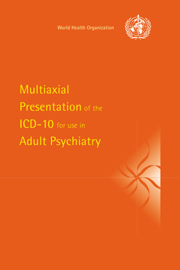Axis I - Glossary of clinical diagnoses
from PART II
Published online by Cambridge University Press: 04 August 2010
Summary
ICD-10 Categories of mental and behavioural disorders (F00–F99)
Organic, including symptomatic, mental disorders (F00–F09)
This section comprises a range of mental disorders grouped together on the basis of their having in common a demonstrable etiology in cerebral disease, brain injury, or other insult leading to cerebral dysfunction. The dysfunction may be primary, as in diseases, injuries and insults that affect the brain directly and selectively; or secondary, as in systemic diseases and disorders that attack the brain only as one of the multiple organs or systems of the body that are involved.
Dementia (F00–F03) is a syndrome due to disease of the brain, usually of a chronic or progressive nature, in which there is disturbance of multiple higher cortical functions, including memory, thinking, orientation, comprehension, calculation, learning capacity, language, and judgement. Consciousness is not clouded. The impairments of cognitive function are commonly accompanied, and occasionally preceded, by deterioration in emotional control, social behaviour, or motivation. This syndrome occurs in Alzheimer's disease, in cerebrovascular disease, and in other conditions primarily or secondarily affecting the brain.
Use additional code, if desired, to identify the underlying disease. The primary code is for the underlying disease and is marked with a dagger (†); an optional additional code for the manifestation is marked with an asterisk (*).
- Type
- Chapter
- Information
- Publisher: Cambridge University PressPrint publication year: 1997



